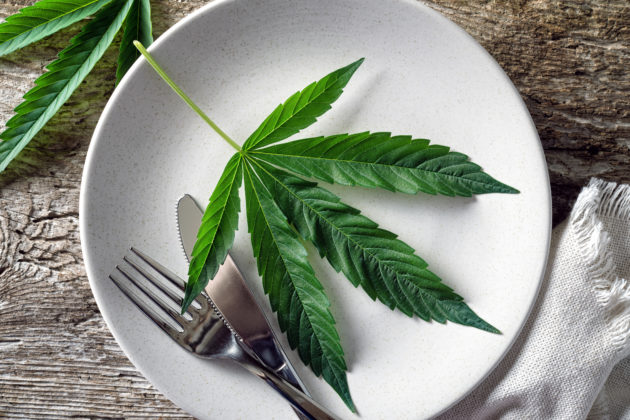
Study finds Canadians are losing interest in cannabis edibles
Food in Canada
Research & Development Food In Canada Specialty Foods cannabis consumer edibles Conceptual image of a cannabis leaf on a plate with a knife and fork.
Conceptual image of a cannabis leaf on a plate with a knife and fork. Cannabis-infused edibles will be legal to purchase for recreational use in Canada in October 2019. A new study from Sylvain Charlebois, senior director at the Dalhousie University Agrifood Analytics Lab, shows that Canadians aren’t as eager to embrace them as they were two years ago.
The study, titled “Edibles and Canadian consumers’ willingness to consider recreational cannabis in food or beverage products: A second assessment” compares Canadian attitudes toward cannabis products with those in 2017, prior to legalization.
Will Canadians embrace edibles?
“We were surprised to see that Canadians are actually less enthusiastic about edibles since cannabis became legal last fall,” said Charlebois.
Only 36 per cent reported that they would purchase cannabis-infused food products once legal, down from 46 per cent in 2017, with 26 per cent saying they would order at a restaurant (down from 39 per cent in 2017). Sixty per cent of Canadians are concerned that cannabis in edible form makes it too easy to overconsume. Meanwhile, concern that greater access to edibles poses a risk to children and pets is still high (64 per cent are concerned with the risk for children; 54 per cent for pets).
“With cannabis edibles being legalized in October, we are frankly curious about the decrease in interest expressed by survey respondents, said Brian Sterling, one of the report’s co-authors. We would like to understand that shift. It will be interesting to see how this perspective evolves as cannabis and infused products become more commonplace.”
Simon Somogyi, Arrell Chair in the Business of Food at the University of Guelph, found perception of the health-related aspects of cannabis particularly interesting: “there’s been much discussion about it in traditional and social media, but most respondents were unaware of the pain-relieving properties of CBD (Cannabidiol).”
Edibles could attract a market of people who are not interested in smoking: 20 per cent of respondents indicated that they do not use cannabis currently but may consider edibles once legalized.
Have Canadian attitudes towards cannabis use changed since legalization?
Support for legalization has dropped slightly with 49 per cent of respondents still in favour (down from 68 per cent). Uncertainty about legalization has increased by seven per cent since the 2017 study. And while most Canadians wouldn’t mind if restaurants started serving edibles, an overwhelming 56 per cent of respondents agreed that cannabis retail facilities should be kept out of residential neighbourhoods.
The stigma of cannabis use is low, however many Canadians (46 per cent) are still uncertain they’d want their co-workers to know they use recreationally. Edibles carry less stigma than other forms of cannabis: 65 per cent see edibles as “a discreet form of recreational cannabis use.”
Some positive associations have developed since legalization: more Canadians now see cannabis as a healthy ingredient (19 per cent, up from 13 per cent in 2017).
Has legalization changed Canadian’s consumption habits?
Thirty-seven per cent of respondents indicated that they use cannabis. Only a small percentage (six per cent) reported that they’ve started since legalization, whereas many (42 per cent) do not use cannabis and have no plans to change. Of the current users, 46 per cent reported that they use it for medicinal purpose.
Notably, the majority of consumers (60 per cent) continue to purchase cannabis products from the same supplier as before recreational legalization—quality, price and convenience were the top reasons given for their loyalty.
Print this page